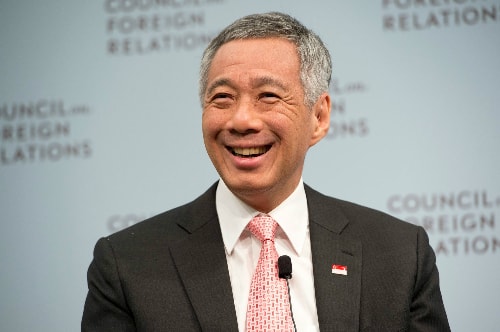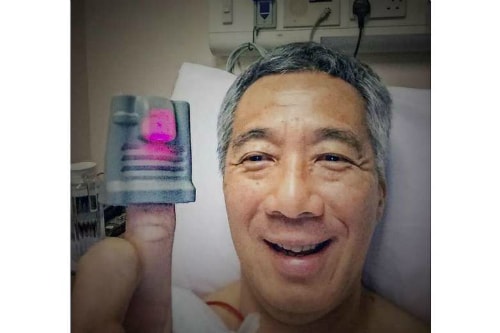How did Mr. Lee Hsien Loong fight cancer?
One morning during a business trip to South Africa in 1992, Mr. Lee Kuan Yew received the bad news that his son, Lee Hsien Loong, had cancer.
At that time, Mr. Lee Kuan Yew was Singapore's Senior Minister and Mr. Lee Hsien Loong was the Deputy Prime Minister and Minister for Trade and Industry. "Long told me the biopsy results showed that he had lymphoma. That was the first time we had heard of this disease," Mr. Lee told the Straits Times in 1993. "We were both shocked."
Three weeks before his father's business trip to South Africa, Lee Hsien Loong had a bleeding episode and discovered three small polyps in his rectum. Initially, doctors thought the three polyps were benign and could be operated on later, but they turned out to be malignant lymphoma.
 |
Singapore Prime Minister Lee Hsien Loong. |
Hearing the bad news, the Ly family was shocked. While his wife was worried about their son's condition, Mr. Dieu, with his vast experience, advised Hien Long to stay calm and do all the necessary tests. The trip had not ended yet, the father could not return to Singapore.
"I'm not a doctor. What could I do if I went back to Singapore with my wife? Would it make a difference if I comforted her? Maybe a little psychologically, but not in essence," Mr. Dieu explained. Being far away, he only took the opportunity to call his son in Singapore late at night or early in the morning. "You are psychologically burdened, so you can't eat well or enjoy the trip. But you have to get the job done. That's life," he said honestly.
Hien Long updated his parents daily. Fortunately, the cancer had not spread to other parts of his body besides his rectum. Following the advice of his sister, Ly Vinh Linh, 38, who is studying epilepsy at the Hospital for Sick Children in Toronto (Canada), Hien Long went to the US for medical treatment.
Despite his health condition, the then deputy prime minister of Singapore remained calm. Just before his trip to the US, he led a delegation to Japan to promote investment. On his last day in the land of the rising sun, Lee Hsien Loong invited reporters to breakfast.
"He had a very good appetite," recalled Kwan Weng Kin, Tokyo correspondent for the Straits Times. "I wondered about the reason for his trip to the US. No one knew he was going to the US for medical treatment." In the US, Lee Hsien Loong was consulted by Professor Saul Rosenburg and Professor Fernando Cabanillas, two leading lymphoma experts.
In mid-November 1992, Lee Hsien Loong returned from the US. He had lost weight and looked extremely gaunt and tired. On November 16, Singapore's then Prime Minister Goh Chok Tong announced to the nation that his two deputy prime ministers, Lee Hsien Loong and Ong Teng Cheong, had cancer. This was nothing short of a national disaster. Lee Hsien Loong was not simply the Minister of Trade and Industry but played a key role in the leadership. In particular, he was expected to be the successor to Prime Minister Goh.
After the shocking announcement, the government began adjusting the staff to support Lee Hsien Loong as he began six rounds of chemotherapy over 18 weeks. Every day, Mr. Long had to go to the Singapore General Hospital to have chemotherapy injected through tubes inserted into his chest. Bathing became difficult because he had to keep his bandages dry. Eating was no longer enjoyable because chemotherapy had made him lose his sense of taste. However, Mr. Long did not vomit like most other chemotherapy patients.
The treatment process weakened his body's resistance, forcing Mr. Long to stay away from crowds. In 18 weeks, he appeared in public less than 6 times and did not attend cabinet meetings.
Thanks to chemotherapy, Mr. Long gradually got better. Besides, realizing that willpower is extremely important, he kept his mind relaxed and practiced meditation. Mr. Lee Kuan Yew shared that his son did not collapse because "without the strength to overcome, everything will end."
In April 1993, Mr. Lee's condition was said to be in remission. Doctors rated Lee Hsien Loong's chances of being completely cured of cancer at 8/10, meaning he still faced a 20% chance of recurrence. On April 11, 1993, Prime Minister Goh Chok Tong announced that Deputy Prime Minister Lee Hsien Loong had returned to work.
In January 2015, at the age of 63, Lee Hsien Loong was diagnosed with cancer again. He had prostate cancer, but it was unrelated to the lymphoma he had previously suffered. On February 15, 2015, Lee, then Prime Minister of Singapore, underwent robotic-assisted surgery and is expected to make a full recovery. Memorial Sloan Cancer Center data shows that patients with similar medical records and treatments have a 99% chance of surviving 15 years.
 |
Prime Minister Lee Hsien Loong shares a photo from his hospital bed before surgery in 2015. Photo: Straitstimes. |
Many experts question whether Lee Hsien Loong's perfectionist work style is the cause of his cancer. Dr. Peng Tiam from Singapore General Hospital believes that there is no scientific evidence to prove that stress leads to cancer, but Professor Sun Yan from the Beijing Cancer Institute (China) thinks otherwise. According to Professor Sun Yan, during the Chinese Cultural Revolution, many leaders and their wives got cancer. They all had one thing in common: acute stress. Professor Sun advised Mr. Long to stop working and take two types of herbs to strengthen his immunity. Mr. Long flatly refused.
Lee Hsien Loong himself did not believe that stress was related to cancer until he received a letter from a lawyer from Kuala Lumpur (Malaysia) who also had lymphoma. In the letter, this lawyer wrote that the doctor said he could work normally but the more he worked, the more tired he became. After deciding to quit his job, the lawyer's health improved significantly.
Mr. Lee Kuan Yew said that the habit of sleeping 8 hours a day had unintentionally affected Lee Hsien Loong's endurance. The pressure of work made both father and son lack time to rest, while Mr. Long was easily tired if he did not get a full night's sleep. However, the first Prime Minister of Singapore still believed in his son's ability as he once said during his lifetime: "If Singapore finds a man who has never had cancer, never had a relapse and is better than Mr. Long, that person should be chosen. But if you cannot find one, you have to use the best you can."
According to VNE
| RELATED NEWS |
|---|


